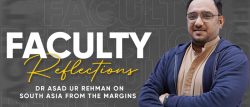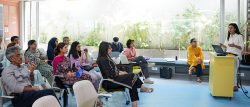Students of Habib University recently participated in a Google-organized programming competition, Hash Code. Two of its teams finished in the top 10 from across the country.
Hash Code is a team-based event where students participate individually or in teams of up to four people, and try to solve a real-world engineering problem. Amidst the Novel Coronavirus (Covid-19) pandemic, this entire event was held online this year. Usually, the first qualification round occurs online while the finals occur at Google’s headquarters.
Around 50 teams from across the country had participated in the competition, including professional software developers. From Habib University, students from its Computer Science discipline in the Dhanani School of Science and Engineering participated in five teams. Of these, two teams finished in the top 10 with Team Code Karo standing at 7th while Team Coding Bats 2.0 were 10th.
Students who participated in these teams, included: Ali Haider Rizvi in Coding Bats 2.0, Shams Arfeen in Code Karo, Salman Younus in Code Karo, Umme Salma in Code Karo and Anand Kumar in Code Karo.
Dr. Waqar Saleem, Assistant Dean, Dhanani School of Science and Engineering, said that participation in international competitions is a healthy activity for students.
“Not only does it allow them to feel part of a larger, global community, it also allows them to pit their skills against others in a friendly environment and take stock of where they stand,” he said.
“These students demonstrated their passion for programming and problem-solving by participating online literally in the middle of the night (the competition took place as per US time). “
The positions, that these teams have earned, he said, are impressive, considering that this was the first time for the students to participate in such an event.
Many of the contestants in Google’s Hash Code are professional software developers, and many teams bank on a good amount of experience and training, Dr. Saleem said, adding that Habib’s teams came in with relatively little preparation yet they did well and this speaks to the passion and excellence of Habib University’s students.
“I am confident that this will inspire more students to participate in such events – there is no dearth of international programming competitions. I am very happy that these students have set the trend and I extend my full support to them and other students for future such events.”
Shams Arfeen, from the class of 2022, who was part of team Code Karo, explained that in Hash Code, teams are challenged to solve an optimization problem related to computation. The team that obtains maximum scores during four-hour-long sessions wins.
Arfeen attributed the success achieved by their team to how talent is valued at Habib University.
“Unfortunately, this kind of talent is not valued here as much as it deserves,” he said, adding that his primary motivation to participate in the competition was to have fun and evaluate himself on the national platform.
Arfeen added that because he realized the opportunity the competition offered, he decided to recruit fellow students for the competition. “On my insistence, Anand, Umme and Salman agreed to give it a shot, despite their tight schedules and deadlines.”
To make things more interesting, three teams comprising of students from Habib University decided to join a common hub where they competed amongst themselves.
The most exciting part of the competition was how the students came up with a strategy for teamwork to increase efficiency.
“Our strategy was that one person would code for some time while the others dictated the algorithm. After some time, we would switch our roles,” explained Arfeen, adding that he was already looking forward to the next iteration of Hash Code.
For Anand Kumar, a CS junior, and one of the participants of the competition, pointed towards the experience of working on real-world problems for a simulated competition.
“Solving a real-world computational problem was the most interesting part of the competition for me, or at least trying to solve a real-world problem, which being a CS student, is our main job,” he said.
“It was an amazing experience and I will hopefully participate next year as well,” he said.
The idea of transforming individuals into critical-thinkers and problem-solvers is not something Habib University limits to its classrooms, rather, it goes well beyond that.
At Habib, students are given space, opportunities, mentorship and an enabling environment to learn, experiment, explore and grow their interests whilst curating them into their passion which helps them become well-rounded individual ready to contribute to their community.




